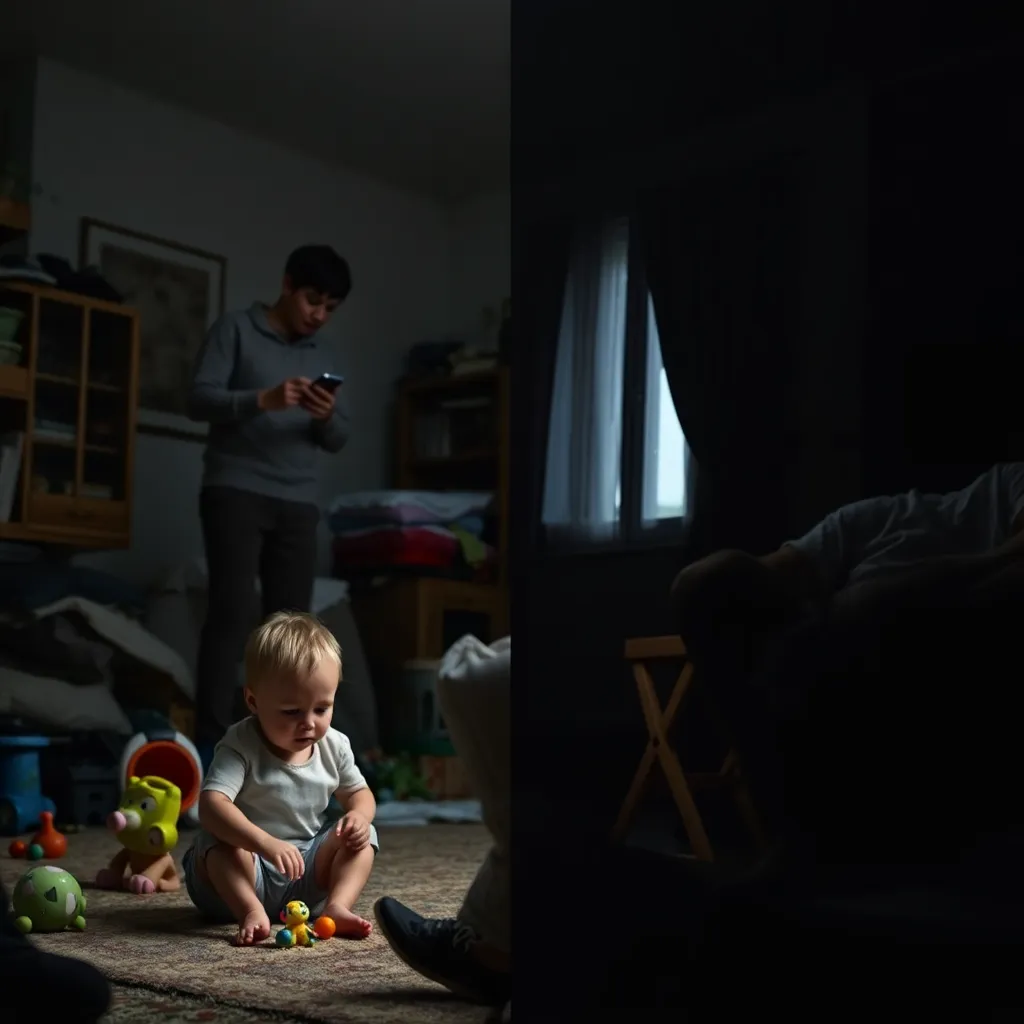Navigating the complexities of family life is no small task, especially when it involves the well-being of children. As parents or guardians, we strive to create nurturing environments that foster growth and happiness. Unfortunately, there are situations where children’s needs can be overshadowed by the interests of others. It’s a delicate subject, but recognizing when a child may be exploited is crucial in taking steps to protect them.
Understanding the signs of exploitation can feel overwhelming, but it’s an essential skill for any caregiver. This article aims to empower you with the knowledge to recognize these signs early. By identifying these red flags, you’ll be better equipped to safeguard the emotional and physical well-being of the children in your care. Our goal is to provide you with a comprehensive understanding of this sensitive issue and to offer practical advice on how to address it effectively.
Throughout this article, you will discover 13 key indicators that may suggest a child is being exploited. These signs can be subtle, often masked by the complexities of everyday life. We’ll guide you through each one, offering insight and support to help you take meaningful action. By the end, you’ll not only be more informed but, hopefully, more confident in your ability to protect and nurture the children who depend on you.
1. Parental Pressure on Achievements

Sometimes, parents may unknowingly place an overwhelming emphasis on their children’s *academic* or *extracurricular achievements*. This kind of *pressure* can inadvertently make children feel their *worth* is tied solely to their *successes*, which may lead to emotional strain.
Consider a scenario where a child consistently *excels* in school, yet feels anxious about falling short of their parents’ *expectations*. When children are made to feel like *trophies* for their parents’ *pride*, it can hinder their ability to develop a *healthy self-identity*.
According to child psychologist Dr. Emily Grant, children who face excessive *pressure* to perform often struggle with *self-esteem* issues later in life. As parents, it’s essential to strike a balance by celebrating *efforts* and *progress* rather than just *outcomes*.
Another family might find themselves pushing their child into activities that align with *parental dreams* rather than the child’s interests. A better approach involves allowing children to explore their *passions* and make *choices* that align with their own *aspirations*.
Ultimately, the relationship between *parental expectations* and a child’s *emotional well-being* is crucial. By recognizing and adjusting any undue *pressure*, parents can help their children grow into *confident* and *self-assured* individuals.
2. Involvement in Adult Conflicts

It’s crucial to recognize when parents involve their children in their own adult conflicts. Children should not be used as mediators or bearers of messages between arguing adults. Such practices place undue emotional stress on the child, who may feel caught in the middle. This not only affects their sense of security but also their understanding of healthy relationships.
Consider a situation where parents frequently argue and expect their child to take sides. This can lead to the child feeling an overwhelming sense of loyalty conflict, which is a heavy burden for young shoulders. It’s essential to establish clear boundaries between adult issues and the child’s environment. Parents should strive to resolve conflicts away from their children and ensure that they feel safe and loved regardless of adult matters.
Expert opinions emphasize the long-term effects of involving children in adult issues. According to child psychologists, such involvement can lead to anxiety and trust issues later in life. Instead, parents should model constructive conflict resolution and maintain a united front when it comes to parenting. This approach teaches children resilience and the importance of healthy communication.
By creating a clear separation between adult conflicts and family interactions, parents can foster an environment of stability and emotional well-being for their children. This practice will help children develop a balanced view of relationships and conflict. Ultimately, the goal is to nurture a loving and supportive family dynamic where children feel secure and valued.
3. Excessive Chore Expectations

Another sign of exploitation is when parents place excessive chore expectations on their children, far beyond what is age-appropriate. For instance, a teenager might be expected to manage household duties that are typically the responsibility of an adult, such as cooking all meals or managing finances.
Such expectations can lead to emotional burnout and resentment in children, as their time for personal growth and leisure is compromised. This scenario often results in children feeling like they have to earn their keep, which can impact their self-worth and relationships in the future.
It’s important to distinguish between teaching responsibility and burdening a child with too many tasks. Experts suggest that assigning age-appropriate chores helps children develop independence without overwhelming them with adult responsibilities.
By maintaining a balance, parents can foster a healthy environment where children learn essential life skills while also enjoying their childhood. This approach not only strengthens family bonds but also prepares children for future independence.
4. Lack of Personal Privacy

In many families, a child’s personal privacy is often overlooked, leading to feelings of being exploited. For instance, if your parents frequently read your diary or go through your phone without permission, it can create an environment of mistrust and resentment.
Imagine feeling like your thoughts and feelings are never safe from prying eyes. This lack of personal space can significantly impact your emotional well-being and foster a sense of vulnerability that is hard to shake off.
Experts highlight the importance of respecting a child’s right to privacy as a crucial element of healthy family dynamics. Dr. Emily Shafer, a renowned family therapist, emphasizes that children who are allowed personal space tend to develop stronger self-esteem and better conflict-resolution skills.
Consider establishing clear boundaries to protect your privacy. Open a dialogue with your parents about your need for personal space and create agreements that respect your individuality.
Ultimately, fostering an environment that respects personal privacy can lead to more balanced and fulfilling family relationships. By advocating for your privacy, you not only protect your emotions but also pave the way for healthier interactions.
5. Children as Emotional Support

It’s not uncommon for parents to inadvertently use their children as a source of emotional support. When adults rely on their kids to fulfill their own emotional needs, it can create an unhealthy dynamic that places undue pressure on the child.
Imagine a scenario where a parent frequently shares adult problems with their child, expecting them to listen and provide comfort. This can lead to a role reversal, where the child feels compelled to become the caretaker, rather than enjoying a carefree childhood.
Experts suggest that parents should seek emotional support from peers or professionals rather than their children. By doing so, parents can preserve their child’s innocence and allow them to develop in a nurturing environment free of adult burdens.
One mother I worked with realized she was sharing too much with her teenage daughter, who began to show signs of stress and anxiety. She decided to join a support group, which helped her process her emotions without involving her child.
By being mindful of the emotional roles within the family, parents can foster a more balanced and healthy relationship with their children. This shift not only benefits the child but also strengthens the familial bond overall.
6. Financial Contributions Demanded

When a partner starts to demand that children make specific financial contributions, it can be a subtle form of exploitation. This might manifest as pressuring kids to use their allowance for household expenses or even work to help cover bills, which can be emotionally taxing for them.
In some families, older children are expected to contribute financially, especially if they have part-time jobs. However, when this expectation becomes a demand or an obligation, it can create an unhealthy dynamic and place undue stress on the child, who may feel guilty if they can’t meet these expectations.
Consider the case of a teenager who is repeatedly asked to pay for utilities out of their own earnings. This scenario not only places a financial burden on them but also shifts adult responsibilities onto young shoulders, which can hinder their personal and educational development.
Experts suggest that financial contributions from children should always be voluntary and not coerced. Encouraging children to save or manage their money can be beneficial, but they should never feel obligated to sacrifice their financial wellbeing for the household.
Ultimately, fostering a home environment where children can grow without financial pressure is crucial. This balance allows them to focus on education and personal growth, knowing they have the support they need to thrive.
7. Limiting Social Interactions

Limiting a child’s social interactions can be a subtle yet powerful way an adult might exploit them. This behavior often manifests as the adult keeping the child from engaging with peers or mentors who could offer support and perspective outside of the family.
In some cases, parents might justify this behavior by claiming it’s for the child’s own protection. However, it can lead to a child feeling isolated and dependent solely on the family, making them vulnerable to manipulation.
Consider the scenario of a child who is constantly told their friends are a bad influence, with little evidence to support this claim. Over time, this can erode the child’s confidence in their own judgment and ability to form healthy relationships outside the family unit.
Experts suggest encouraging children to participate in extracurricular activities as a way to foster independence and social skills. This involvement helps them build a network of supportive relationships that can be crucial in situations where they might need advice or assistance.
By fostering open lines of communication, you can help your child feel comfortable discussing their friendships and experiences. This openness ensures that they are not only heard and valued but also empowered to express themselves freely.
Ultimately, nurturing a child’s ability to form and maintain healthy social connections is a gift that will serve them throughout their life. It’s a key step in ensuring they grow up to be well-adjusted and independent individuals.
8. Using Children for Validation

In some relationships, parents may find themselves subtly using their children as a source of validation for their own self-worth. This can often manifest when a parent excessively boasts about their child’s achievements to boost their own self-esteem, inadvertently placing undue pressure on the child.
Consider a scenario where a parent insists their child performs in a school talent show, not for the child’s enjoyment, but to receive praise from other parents. This can lead to the child feeling like a mere extension of their parent’s ambitions, rather than an individual with their own passions and interests.
When children are used as a means to gain social approval, it can distort their sense of self and lead to feelings of inadequacy. It’s crucial for parents to recognize and respect their child’s autonomy, celebrating their individuality rather than using them as a tool for personal gain.
Experts suggest that parents should engage in open dialogues with their children about their interests and aspirations. By doing so, parents can foster a supportive environment that emphasizes love and encouragement over validation-seeking behaviors.
Ultimately, allowing children to shine on their own terms strengthens the parent-child bond and fosters a healthier, more balanced relationship. Embrace the unique journey of your child, celebrating their milestones without making them a reflection of your self-worth.
9. Public Criticism of Children

Publicly criticizing children can leave them feeling deeply embarrassed and insecure. When parents engage in such behavior, they might not realize the long-term impact on their child’s self-esteem and confidence.
Imagine a child being scolded in front of their peers for a minor mistake. This public shaming can lead to feelings of inadequacy and self-doubt, making children question their own worth and abilities.
Experts emphasize the importance of handling criticism in a more private and constructive manner. Instead of calling out a child’s faults in public, parents can choose to have a calm and supportive conversation in a private setting.
Children thrive in environments where they feel supported and understood. By avoiding public criticism, parents can foster a sense of security and trust, encouraging their children to learn and grow from their mistakes.
By choosing to criticize privately, parents can build a more positive and nurturing relationship with their children. This approach not only boosts the child’s confidence but also strengthens the family bond, creating a safe space for open communication.
10. Forced Participation in Hobbies

When children are **forced to participate** in hobbies that they do not enjoy, it can lead to feelings of **resentment and frustration**. Imagine a child who loves drawing being pushed into competitive sports simply because a parent values athletic success over artistic expression.
Parents may sometimes **project their own unfulfilled dreams** onto their children, compelling them to pursue activities they themselves wished they had. This not only puts undue pressure on the child but also **disregards the child’s unique interests** and talents, stifling their natural curiosity and growth.
To foster a more **supportive environment**, parents should focus on understanding and nurturing their child’s genuine interests. This means having open conversations about what they enjoy and **encouraging exploration** rather than dictating their paths.
Ultimately, a child who feels **supported rather than forced** is more likely to thrive and develop a healthy sense of self. Acknowledging their preferences can strengthen the parent-child bond, creating a more harmonious and loving relationship.
11. Ignoring Children’s Opinions

In many families, children’s opinions are often overlooked, leading to feelings of frustration and insignificance. When parents consistently ignore their children’s voices, it sends a message that their thoughts and feelings are not valued, which can erode their self-esteem over time. It’s important for parents to remember that children, even at a young age, have unique perspectives that can enrich family dynamics.
Consider a scenario where a child expresses dislike for a particular extracurricular activity, yet their discomfort is dismissed as trivial. This can create a sense of powerlessness and may result in the child withdrawing or acting out in other areas. By actively listening and engaging with their opinions, parents can foster a more supportive and understanding environment. When parents validate their children’s feelings, it empowers them to communicate more openly and assertively.
Experts suggest that by involving children in family decision-making processes, parents can nurture their sense of autonomy and responsibility. For instance, allowing children to choose their own outfits or decide on family leisure activities can significantly boost their confidence. These small gestures show children that their views are respected and considered, which strengthens the family bond.
Listening to children’s opinions can sometimes reveal surprising insights that adults may overlook. Kids often have a straightforward and honest perspective that can help solve family issues in unexpected ways. By valuing their input, parents can build a stronger, more connected family unit.
12. Highlighting Children’s Mistakes

Many parents, often unintentionally, find themselves in the habit of highlighting their children’s mistakes more than their achievements. This behavior can lead to children feeling like they are constantly under scrutiny, impacting their self-esteem and confidence. Imagine a child coming home with a report card filled with As and one B, only for the B to draw all the attention. In the long run, this focus on errors rather than successes can make children feel that their worth is tied solely to their perfection.
It’s crucial to remember that everyone makes mistakes, children included, and these moments can be valuable learning opportunities. Instead of immediately pointing out what went wrong, try engaging in a conversation about what they learned from the experience. Share a story from your own life where a mistake turned into a powerful lesson. This not only normalizes making mistakes but also strengthens the bond as children see their parents as relatable figures.
Experts suggest that parents use a more balanced approach when addressing mistakes. Dr. Andrea Bonior, a clinical psychologist, recommends the “sandwich technique” where criticism is nestled between two positive remarks. For instance, you might acknowledge your child’s effort, then discuss the mistake constructively, and finally, reinforce your confidence in their ability to improve. This approach helps maintain a supportive environment where children feel encouraged rather than defeated.
By shifting the focus from mistakes to learning, parents can foster resilience and a growth mindset in their children. Encourage them to set personal goals and support them in their journey to achieve these milestones. This proactive stance not only builds self-assurance but also teaches children the value of perseverance. Ultimately, creating a nurturing environment where children feel valued for their efforts can lead to healthier, more confident individuals.
13. Exploiting Children’s Talents

In the pursuit of nurturing their children’s abilities, some parents may inadvertently cross the line into exploitation. They might emphasize their child’s skills not for the child’s benefit but to gain social standing or personal satisfaction. This approach can lead to children feeling more like a means to an end rather than being cherished for who they are. It’s crucial for parents to reflect on their intentions and ensure that their support is genuinely for the child’s growth and happiness.
Consider the story of a young piano prodigy who was pushed to perform at every social gathering. Though the applause was constant, the pressure from his parents to be perfect took away his joy of playing. Rather than fostering a love for music, the focus was on showcasing his talent to impress others. Parents should prioritize nurturing their child’s interests authentically, allowing the child to enjoy the journey without the burden of excessive expectations.
Sometimes, the desire to showcase a child’s talent can stem from a parent’s unfulfilled dreams. A parent might see their child’s accomplishments as a reflection of their own identity and seek validation through their child’s success. By recognizing these patterns, parents can break the cycle and instead encourage their child to pursue their passions for their own reasons. This approach helps children develop a sense of self-worth that is independent of external validation.
Ultimately, the key is to foster a supportive environment where children feel free to explore and express their talents as they wish. This may mean sometimes stepping back and allowing them to make mistakes and learn at their own pace. By doing so, children can develop genuine confidence and resilience, knowing they are valued for who they truly are. As a result, they are more likely to pursue their interests with passion, rather than pressure, leading to a more fulfilling life.
Conclusion: Creating Beautiful Outdoor Spaces
In navigating the complex terrain of relationships, recognizing the signs of exploitation, especially when it comes to children, is crucial. This article highlighted 13 key indicators, including manipulation of children’s emotions, prioritizing personal needs over children’s well-being, and using children as leverage. We explored the red flags of controlling behavior, lack of empathy, and emotional neglect, among others.
As a next step, take a moment to reflect on these signs within your own relationships. This self-awareness is the first step toward fostering a healthier environment for both you and your children. Consider having an open, honest conversation with your partner about any concerns you may have, and seek professional guidance if needed.
Remember, safeguarding the emotional health of your family is paramount. Bookmark this article as a valuable resource to revisit whenever you need to reassess your relationship dynamics. By doing so, you equip yourself with the knowledge to build a nurturing and respectful environment for your children.
Embrace the journey toward relationship success by staying informed and proactive. With the right tools and mindset, you can create a future where love, respect, and understanding thrive. Your proactive steps today lay the foundation for a stronger, more fulfilling tomorrow.
